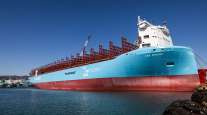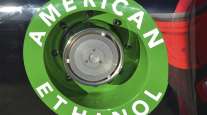Staff Reporter
ClearFlame Eyes Jump in Ethanol-Powered Truck Use After Sale

[Stay on top of transportation news: Get TTNews in your inbox.]
ClearFlame Engine Technologies expects to deploy as many as 30 of its ethanol-fueled Class 8 trucks through the end of 2024, CEO BJ Johnson told Transport Topics.
Currently, six trucks using ClearFlame’s technology, which adapts a diesel-fueled internal combustion engine, are deployed with potential customers, Johnson said in an interview Jan. 29.
Geneva, Ill.-based ClearFlame on Jan. 24 announced its first truck sale to used truck parts supplier Vander Haag’s Inc.
Vander Haag’s, which also operates a used truck and trailer dealership network, plans to use the truck to deliver parts to its 11 locations across seven states.
“Vander Haag’s has been an enthusiastic development partner for ClearFlame because of their market readiness, cost savings and use of existing infrastructure,” CEO John Vander Haag said.
He continued, “Many of our customers don’t have the capital, infrastructure or light-duty cycles needed for [electric vehicle] adoption, and we see a massive opportunity to increase our market share by bringing customers the sustainability they desire without increasing costs.”
Fleet leaders understand the importance of reducing emissions over the next 12 months. Reaching those goals requires support and partnerships, and ClearFlame can help. Visit our website to learn more.
https://t.co/LrH8zkklYA #sustainablesolutions #cleanfleets #cleanair pic.twitter.com/TgAH7U4BT7 — ClearFlame Engine Technologies (@ClearFlameEng) January 31, 2024
Beyond the first sale, ClearFlame expects to have further deals in place by the end of the first half of 2024, and Johnson expects to have a first run of 10 trucks booked for deployment by the end of February.
For the first sales, ClearFlame will buy a lightly used truck and upfit it and then lease the truck back to the customer, said Johnson, adding: “That way, our early customer/partners don’t have to take any asset risk on the technology.” Further down the line, he said, customers will be able to supply the truck themselves, and ClearFlame will charge a one-time upfit fee.
ClearFlame’s expected 20-30 deployments for testing and then leasing in 2024 are likely to be booked up by the time of the Advanced Clean Transportation Expo in May, the company’s founder added.
Many of the company’s sales are likely to be in the Midwest corn belt, Texas and the Southeast, Johnson said.

Johnson
“Really, what’s key for ClearFlame is less the proximity to the ethanol, which is everywhere, so we can always solve that problem. It is more about where are people putting on routes that really aren’t suitable for EVs, either because they’re long distance or because they’re running multiple shifts of drivers, and they can’t afford the downtime that comes with charging,” he said.
“I don’t say that to be anti-EV, but I think the world is rapidly realizing we need a complement to EV, and ClearFlame is capable of being that. So we won’t be all places overnight, but it won’t just be Iowa,” he added.
RELATED: Trucking Urges Zero-Emission Approach That Goes Beyond EVs
ClearFlame’s sales pitch is how little it changes on existing vehicles and the cost-effectiveness of its low emissions solution. Johnson told TT the company changes about 5% of the parts in an engine, including the fuel injection, hot air and hot exhaust plumbing plus the engine computer unit.
How does hydrogen fuel cell technology fit into freight transportation? Find out with Parker Meeks, the CEO of Hyzon, a company that designs and manufactures fuel cell technology for heavy-duty transport applications. Tune in above or by going to RoadSigns.ttnews.com.
In its first pilot trials, ClearFlame’s truck reduced carbon emissions by nearly 45% compared with an identical vehicle with a diesel engine, with greater savings expected in the future.
ClearFlame’s system uses denatured fuel ethanol at the moment. The engine is modified to accept this fuel in an unaltered format, Johnson said.
But trucks with ClearFlame’s engine modifications are built to operate on a range of decarbonized liquid fuels, including ethanol, green methanol or green ammonia.
The company deploys the technology through diesel engine rebuilders, who source the parts required, Johnson said.
“We don’t have to reinvent production processes and supply chains,” he said, adding: “We work with companies that have been rebuilding diesel engines for decades. The process of building or rebuilding a diesel engine is basically identical to the process that it takes to integrate ClearFlame.”
ClearFlame is building a network of trained rebuilders, he said.
Looking forward, Johnson expects hundreds of sales in 2025.
Delivering on building trucks and advancing from there is where many an industry disruptor has foundered, but Johnson and his team do not need to build a production line or secure planning permission for manufacturing facilities.
Also, the company’s backers have deep pockets. In March 2023, the company raised $30 million in Series B funding. The latest round of investments was led by Mercuria Energy Group, one of the world’s largest commodity trading companies.
Want more news? Listen to today's daily briefing above or go here for more info
Mercuria and Breakthrough Energy Ventures, an investment firm founded by Bill Gates, both made their second investments in ClearFlame in the Series B funding round.
New investors in the company have pockets that are just as deep. Mining giant Rio Tinto was an investor for the first time in the Series B round, ClearFlame said.
ClearFlame secured $17 million in Series A financing in 2021.





